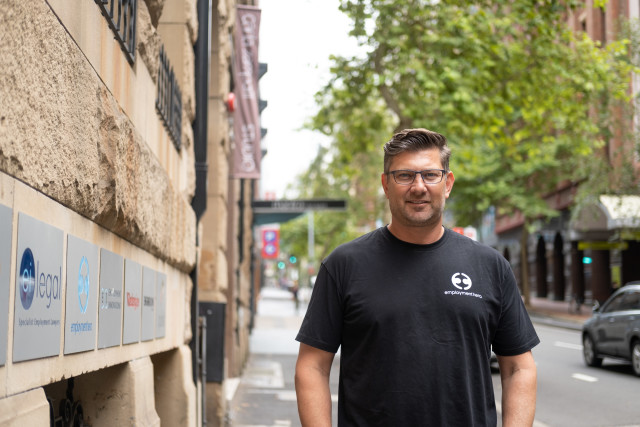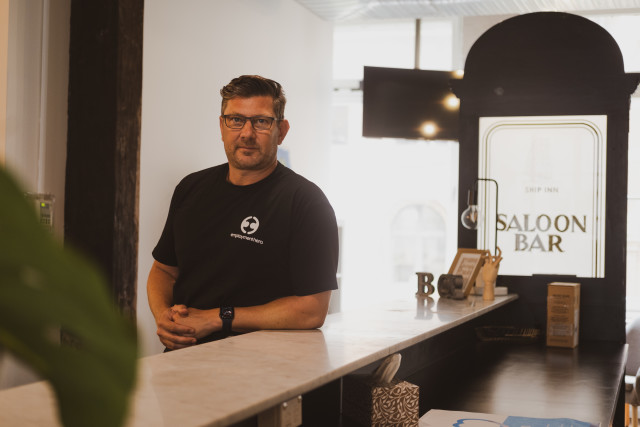While we tend to imagine a typical business to be a large corporation, 90% of business owners on the planet actually run a small or medium business.
From restauranteurs to professional services and retailers, most operators started their venture out of a passion for their field. They don’t have degrees in human resources or business management, despite these having the ability to make or break their business.

According to Ben Thompson from HR, payroll and people management software firm Employment Hero, “managing employment is incredibly technically difficult in this country.”
Ben’s business has grown 5 times every year for the last 3 years.
He continues, “Other aspects, such as psychology, how to motivate people – no one actually teaches any of that. But the thing that’s most important to being a great business is being a great employer.”
We caught up with Ben in the lead-up to his webinar about tactics for small businesses which was held on 1 March. This webinar is part of Reboot, a series of free events designed to help Sydney small businesses learn strategies to thrive in 2021.
What would you say is a common management problem faced by Sydney small businesses?
Given most small and medium-sized enterprises don’t have internal HR departments or dedicated payroll teams, it falls to owners and managers to manage people, including their productivity and morale.
Over the last 12 months, we have seen a paradigm shift in the way people work. The hybrid workplace, where some people work in an office and others work remotely, is here to stay.
We’re dealing with entirely new challenges, including Zoom fatigue and team morale. This challenge is common to so many businesses we work with and requires a new skill set from small business owners.
What does this change look like for your business?
Fewer people are coming into Sydney, as they increasingly work from home or choose to live outside the city. But we see this as an opportunity. At our workplace, we’ve stopped thinking about our office as an ‘office’. It is a social hub. We see Sydney as a place to bring our team together to build rapport, collaborate and socialise.
We’re going to bring more people into Sydney than before Covid-19, to have big social events together. This [time] should be recognised as an opportunity for people to come together as businesses and the people who adapt to this the fastest will be the biggest winners.

What advice do you have for businesses looking to adapt to this new way of remote work?
There are 2 key strategies for making remote work successful. The first is to be very purpose-driven and clearly articulate business objectives. These objectives need to be seen as problems to be solved. The problems should then be allocated to the right people with the best-suited skills and experience.
This methodology is called objectives and key results. If you can do a good job of this, your employees don’t have to physically be in the same place. They can work productively anywhere on the planet.
My second piece of advice is to combat any feelings of isolation and disengagement. Reward, recognition and regular coaching are therefore much more crucial.
We all want to feel like we’re contributing and that we’re valued. If you don’t actively recognise your employees, they will become disengaged and go somewhere else. Build a system into your business to make active rewards frequent.
What’s your advice for employers looking to support their team’s mental health?
I am a big advocate of employee assistance programs. These provide professional support, including doctors and counsellors, in the workplace.
In my business, everyone has the program’s phone number and can consult the program for issues in life and work, completely free. The programs are very cheap for the business, costing a few dollars per person. If one of your employees ends up taking a month off, the costs would be much higher! And it’s important that people have an independent third party to talk to.

Crisis or change can sometimes create opportunity. What opportunity could small businesses seize in the current climate?
Technology has never been cheaper, nor better, nor more accessible. The world is becoming digitised and if you’re not, you will be left behind. Whether you’re in retail or hospitality, there is so much you can achieve with technology. Don’t even think about it, just do it.
Why is being a good employer so important?
People don’t just work in buildings with names on them: 70% of employees work for a small and medium-sized business. Why should 70% of people have a second-rate employment experience?
There is a lack of confidence among small business owners as employers. You pick up the Sydney Morning Herald and are likely to see a story about a small businesses owner who got payroll wrong. That’s the story small business owners hear in their head when they’re lying awake at night.
If we have tens of thousands of businesses in Sydney petrified of being employers, there’s going to be fewer jobs in our city. That’s what we’re fighting against, trying to make businesses confident and proud as employers.
Reboot: free small business webinar series
Ben Thompson talked about how you can grow by keeping your team productive and supporting mental health at Reboot, our free business webinars for small businesses.
Reboot is designed for Sydney retailers, hospitality owners, startups, entrepreneurs and professional service businesses. Each webinar host shares insights unique to the challenges and opportunities of our time and workshops real problems with business owners just like you.
Reboot is produced and facilitated for the City of Sydney by Zambesi. Zambesi is a collective of high growth tech entrepreneurs who are keen to share their skills and highly practical know-how. Founder and CEO, Rebekah Campbell is a serial entrepreneur who has been the force behind successful music company, Scorpio Music, and Hey You, Australia’s largest technology application for cafes and restaurants.
The next round of Reboot talks takes place in May 2021.